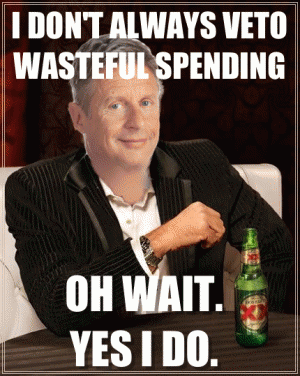Libertarian Complaints that Gary Johnson Didn't Handle his 2012 Campaign Finances Correctly
A book-length critique from longtime Libertarian George Phillies argues the party didn't know the truth about campaign debt, and that Johnson spent too much on staff and not enough on "outreach." Gary Johnson responds.
Gary Johnson's 2012 campaign didn't manage its finances well enough for the Libertarian Party to trust him this time around, argues longtime Libertarian Party (L.P.) member, activist, and frequent candidate George Phillies in a book-length critique called "Surely We Can Do Better."

Following is a summation of what Phillies found alarming about the Johnson '12 campaign. Phillies' technique is to walk through every available public filing regarding the campaign's expenditures and debt and lay out the results month by month, so it makes for a long, complicated read. (It's further complicated by the fact that Johnson had his aborted campaign for the Republican nomination that ran for a few months before he aimed for the Libertarian crown.)
One of Phillies' concerns is that, as is perfectly legal, later filings often amend the numbers on earlier ones, including the amount of outstanding debt at a given date.
Thus, the latest debt figure for the campaign available for consideration by L.P. delegates before they picked Johnson as their candidate in 2012 showed a significantly lower debt than later amended filings. "2012 National Convention delegates could read that Johnson's campaign, at the end of March, was in debt for $152,373," Phillies writes. "The actual debt as of March 31, 2012 [as revealed in later amended filings] was $1,078,371, seven times as much.
While all the specifics are laid out in great detail month by month, the summation of Phillies complaint is:
His campaign raised two and a quarter million dollars in private donations, $632,017 in Federal campaign matching funds, and ended $1,538,118 in debt, a total over 4.4 million dollars. Of that, $627,000 went for general election outreach and $240,000 went for nominating outreach. That's under 20% of campaign dollars earned or borrowed on outreach.
Whether this is an outrage or not depends on your expectations and understanding of professional politicking. Various Johnson defenders I've talked to or read in social media debates basically say, look, there is a core building cost of a professional campaign, and if the campaign doesn't raise much more money over that, then staff will seem to be "overbalanced" to an outsider.
Others less kindly inclined wonder if political campaigns like this function as just ways for pros to make a tidy living for a few months off of activist money. Phillies focuses on hourly wages that he seems to think an L.P. donor might choke on, detailing thousands of "mid level management" hours paid mostly from $95-125 an hour, and over a thousand hours of "senior political officer" hours at $325 an hour.
Phillies' read of the expenditures shows him marking the campaign as having spent in the general election on "media - $204,000; travel - $139,000; email ads - $28,000; web ads - $31,000; printing, shipping, and mailing - $225,000." Those are the categories Phillies considers "outreach."
That's "a total of $627,000," Phillies writes. "Relative to 2.2 million dollars in cash received, that's a bit over a quarter of all income. Relative to that 4+ million dollar campaign [including debt], that's about a seventh of all money received or taken on as debt."
Phillies also calculates that given a Federal Elections Commission (FEC) announced attempt to claw back $332,191 of the money it gave in federal matching funds, that Johnson's accepting of those funds might have actually cost his campaign money given the cost of complying with their bookkeeping. The full FEC audit of Johnson '12 is here.
I asked Johnson about some of these criticisms of his 2012 campaign's finances last week, after the Blaze-televised Las Vegas debate. He brushed off the debt question, as nearly all of it was owed to his campaign manager Ron Nielson, who agreed either to waive it or to accept "committee data" in payment. This essentially means, Johnson explained, that the campaign got lots of his services essentially as volunteer. Given that, the supposed debt is not an issue he thinks should concern donors or supporters. He also stresses that no money given to this campaign will in any way be used for any debt on any past campaign.
A more meaningful metric for Libertarians to consider, Johnson told me, is the number of votes he got per dollar spent, a number he thinks more than respectable given his 1.27 million votes, and he doesn't feel it accurate to call his campaign spending overweighted against outreach vs. staff.
The most important thing Johnson wants Libertarians to understand about last go-round's finances vs. this year's is that "we don't go anywhere if it's the same amount of money as last time."
Show Comments (50)